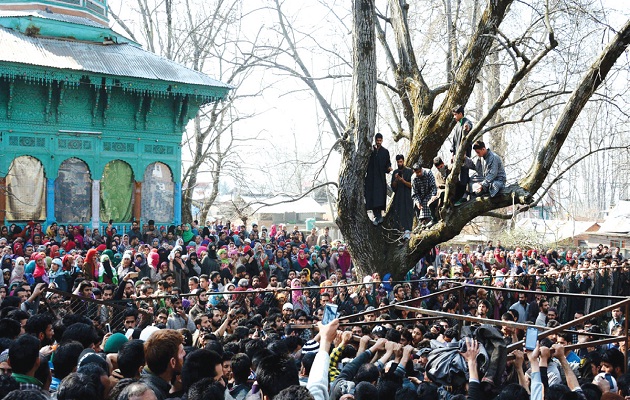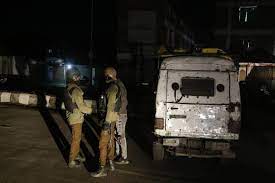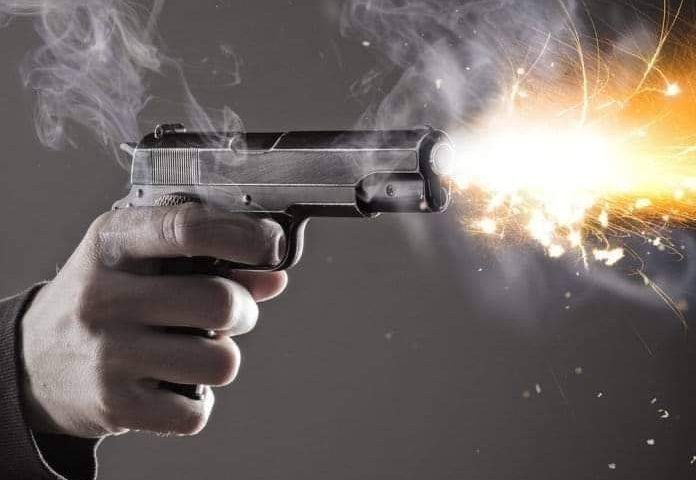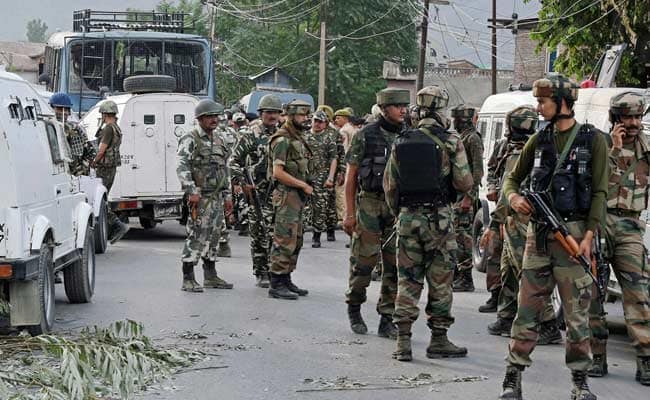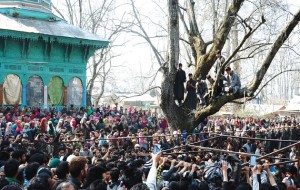 Three Hizbul Mujahideen militants—including Ishaq Ahmad Parry alias ‘Newton’—died in an overnight gunfight with forces in Dadsara village in south Kashmir’s Tral area, triggering protests and a spontaneous shutdown. Two other slain militants were identified Asif Ahmad Mir of Dadsara and Ashiq Hussain Bhat of nearby Charsoo village in Awantipora area.
Three Hizbul Mujahideen militants—including Ishaq Ahmad Parry alias ‘Newton’—died in an overnight gunfight with forces in Dadsara village in south Kashmir’s Tral area, triggering protests and a spontaneous shutdown. Two other slain militants were identified Asif Ahmad Mir of Dadsara and Ashiq Hussain Bhat of nearby Charsoo village in Awantipora area.
The gunfight, which had started last night, ended this morning with the death of three militants, a police official said.
He said massive protests and clashes rocked the gunfight site since last night when the encounter started and several youth “tried to break the cordon and help the militants, who were holed up in a residential house, flee.” The cops however fired dozens of teargas shells at the protesters to keep them away from the gunfight site, he said.
Residents of Dadsara, where the gunfight took place, told KP this morning that they heard loud explosions since last night. “It looked as if a war was going on,” said a group of locals, who wished not to be identified by names. “The explosions triggered panic in the area.”
A police official, who was part of the gunfight, said police recovered the bodies of three militants from the debris of the house—razed to ground with explosions—at 3 am on Thursday.
Superintendent of Police Awantipora, Muhammad Irshad, claimed three AK-47 rifles were recovered from the slain militants.
“The gunfight was a joint operation of J&K Police’s Special Operations Group, army and CRPF,” he said.
In a press release issued here this afternoon, the CRPF said: “Our personnel operated relentlessly and killed three militants in Dadasara village of Tral. The operation started around 6.45 pm on Wednesday and ended on early Thursday morning.”
As the news of the death of three militants spread in the area, people thronged Dadsara, Laribal and Charsoo—the native villages of the slain gunmen—to participate in their funeral prayers.
Reports said thousands of people offered the funeral prayers of the slain militants while women sang song that praised their valour and courage. Scores of youth also raised pro-freedom and anti-India slogans as they marched in the funeral processions, witnesses said.
In Laribal village—the native place of Ishaq Parray alias “Newton”—hundreds of people joined his funeral prayers while scores of women encircled the graveyard where he was laid to rest.
After the funeral prayers of ‘Newton’ were held at Laribal, people moved to Eidgah at Dadsara to join the funeral prayers of Asif and then went to join the funeral of Ashiq at Charsoo.
During the day, clashes erupted at many places between youth and government forces.
In Lariyar village—more than a kilometer away from the encounter site—youth attacked CRPF personnel with stones but they retaliated with teargas shelling.
Youth also tried to block the Srinagar-Jammu highway at Charsoo, but police swung into action, retaliated with teargas shelling and chased the protesters to interiors of the area. The movement of traffic on the highway was affected for some-time, but resumed later.
Meanwhile, following the death of three militants, a spontaneous shutdown was also observed in Tral and Awantipura areas. All business establishments and government offices remained closed while public transport was off the roads.
‘Don’t Worry About ME’
At their ancestral graveyard in Charsoo village in south Kashmir’s Awantipora area, a person had seen Ashiq—who died in a gun-battle with forces in Dadsara Tral on Thursday—crying loudly near the grave of another slain militant who is laid to rest in the same graveyard. Today, Ashiq was laid to rest at the same place where he was seen crying aloud to mourn the death of Aijaz Ahmad, another slain militant, on August 7, 2014.
“The person who told me about this (crying incident) had seen two other boys also at the graveyard. As soon as I went there, they had left and then there was no news of my son,” said Muhammad Shaban Bhat, father of Ashiq, at his Charsoo residence.
Aijaz—who died in a gunfight with forces in Kangan village of Pulwama—was a close friend of Ashiq, according to locals.
Two days before joining the militant ranks of Hizb-ul-Mujahideen, Ashiq remained out of home for a night without informing us, his father said. “When I asked him where he was, he said he was on a night duty at some hospital.”
Ashiq alias ‘Ubaida’ had recently completed his medical assistant training in a paramedical institute in Pulwama. Initially, Muhammad Shaban said “we tried to find him everywhere, but once we failed, we lived with the reality.”
“One day an unknown person dropped a letter of Ashiq at our home. It read: You people stay happy. You don’t worry about me. I chose my way. Offer ‘Nimaz’ regularly and remember me in prayers.” The letter from Ashiq “made us to live with the reality,” he told KP.
On 8th September—more than a year later—Ashiq’s mother suffered a heart stroke and died. She had already undergone a heart transplant.
“She was worried about Ashiq like every mother happens to be about her child,” Bhat said.
Ashiq was listed an A++ Category militant in police records after his name cropped up in the Udhampur militant attack on August 5 last year—when militants attacked a BSF convoy killing two of its personnel and injuring many others. A Pakistani militant was killed and another one (Naveed) caught alive during the attack.
‘Never Saw Him Since He Joined Militancy’
Ishaq Parray alias ‘Newton’—known by this name for his academic brilliance—will continue to be remembered by us by this name (Newton), his friends at his native village Laribal, told KP.
In the village overlooking Shikargah forests, Iqbal Ahmed—Ishaq’s cousin—said the family has to “now live with an unfulfilled wish of not seeing him before he left us.”
Ishaq, 21, scored 98.4 per cent in Class X and 85 per cent in Class XII examinations.
“He never showed us his face since he became a militant. He would never dare to look into our eyes directly. He respected his elders a lot,” Ahmad said.
In March 2015, Ishaq left his home to pay his fee at a computer center.
“For the first time, he (Issaq) asked for Rs 1000 to pay his tuition fee. That was the last time we saw him,” said Muhammad Ismail Parray, a retired government employee.
Everyone in the locality was seeing him as a doctor, his relatives said. “But his over sensitive nature had triggered something deep inside his heart. He was intelligent. He must have been observing the events around him. He grew up watching the Asiya-Neelofar rape and murder case, the hanging of Afzal Guru. He could understand Quran and Hadith better than us,” Ahmad said.
It was not only his family and friends in the village who were ‘shocked’ by his joining the militant ranks, police was equally “disturbed.”
“When we went to a police station to lodge a missing report, policemen there told us ‘don’t put your boy in trouble unnecessarily’, try to locate him with relatives and friends,” Ahmad said.
‘His Father Was Used As Human Shield By Army’
At the martyrs graveyard in Dadsara—the grave of Asif was dug parallel to the grave of his father Muhammad Yusuf who died when army “used him as a human shield in ‘90s.”
When Asif was three-year-old, his father—a shopkeeper—was taken by army to show them the way to a nearby village Lariyar where they had inputs about presence of militants, locals told KP.
“As the encounter broke out there, he was used as human shield and got killed in 1996,” said Asif’s brother, Tawseef Ahmed.
Asif had done his graduation as a part time student and was working as electrician.
Everyone in village knew him as an ace cricketer. “He was a wonderful all-rounder, but batting was his strong domain,” his friends, who joined his funeral, told KP.

